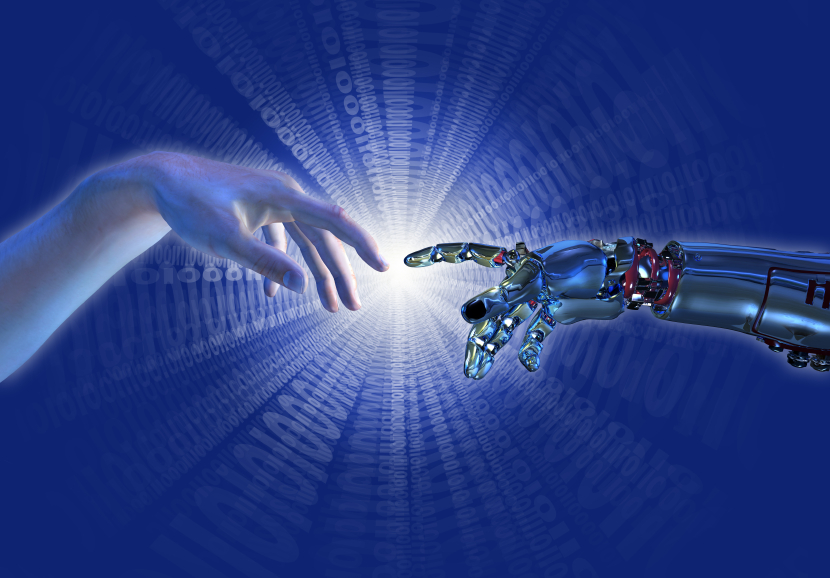Gregor Puppinck, PhD, Director of the European Centre for Law and Justice explains how human rights are becoming “trans-humans rights” under the influence of individualism, skepticism and biotechnologies. Human rights courts are currently redefining the “new man” through the creation of post and trans-humans rights.
How does trans-humanism enter into the legal field?
The rights guaranteed by the European Court of Human Rights, define man. In 1950, when the Convention was signed, these rights were defined in order to protect the inherent abilities of human beings, their nature, which distinguish man from animal and manifest his or her dignity.
At the time, man was not technological, and the existence of a human nature and dignity as the basis of rights was well established. But today, biotechnology can not only enhance our natural abilities, but also endow us with new ones. A renewed man emerges from the development of technology, and human rights accompany this development. Advances in biotechnology, by changing mankind also increase his rights. In return, the law, as a tool of social representation and organization, is capable of integrating scientific artifice in contemporary anthropological conception. Man defines human rights, which as a consequence redefine an “enhanced man”, by the evolution of customs and techniques, and so on. This circular and upward reasoning may develop in coherence thanks to equivocal notions such as “human dignity” and “freedom”, which are the basis of the discourse on human rights.
How did biotechnology influence human rights?
Human rights express and set as a standard successive conceptions that society makes about man: there were ‘humanist’ rights followed by ‘personalist’ rights. It is nowadays post-human rights that are paving the way for trans-human rights.
Post-humanism is the domination of individual wills over human nature. As a result, it is replacing human rights with ‘rights of individuals’. Although the wording of the Human Rights adopted in 1950 has not changed, their individualist interpretation has altered, even revolutionised, their content. Thus, the Convention recognizes the right to life, but the individual will to die or to abort a pregnancy is prevailing over that right. Assisted suicide, euthanasia or abortion are post-human rights.
Trans-humanism is about the surpassing and substitution of human nature by biotechnology. Access to these technologies is becoming an individual right because they allow everyone to achieve himself or herself in a greater way. By becoming a human right, technology – the artifice – is humanized, socially integrated into our evolutionary conception of man.
Thus, asserting the existence of a “right to have a child unaffected by the disease”, the European Court of Human Rights has incorporated the techniques of genetic screening in the definition of rights. Eugenics becomes therefore a component of an increased human nature. It is a trans-human right.
This passage from human nature (humanism) to the individual will (post-humanism) and eventually to technology (trans-humanism) is perceived as extending our freedom, our autonomy, through the increasing faculty to define ourselves in a limitless way. Thus, far from challenging the human rights, post and trans-humanism are renewing and improving the fulfillment of the promise of happiness offered to mankind during the eighteenth century.
Does the Court not pass judgment on these techniques?
In a new way, the Court now considers that a moral argument has no value in itself (because it necessarily refers to a certain idea of man), but only in a sociological way, according to the social acceptance it enjoys. Any idea of mankind would be relative. In 2010, it held that: “concerns based on moral considerations or on social acceptability are not in themselves sufficient reasons for a complete ban on a specific artificial procreation technique such as ova donation.” Legal limitation to the individual will is no longer to be accepted if it is based on a conception of man or good. The Court requires scientific arguments. For example, in a recent case of adoption by a couple of women, it rejected the moral argument of the government who wanted the ban, asking for scientific evidence that it is never something good for a child to be raised by a same-sex couple.
What do you attribute this change to?
The Court is affected by ambient skepticism and relativism. It has lost confidence in the ability of legislators to pass moral judgment on “right” and “good”. Science is what is left as “truth” to the Court for founding its judgments. Actually, scientism is the last refuge of skeptics before nihilism.
This moral skepticism destroys human rights in that they result from non-scientific moral choices and thus reduces these rights to the sole principle of freedom, which also implies the one of equality. And this freedom is the undefined will of individuals. It is the passage of human rights to the “rights of individuals”.
Specifically, the Court understands its case law as inherently progressive. For it: “the Convention is a living instrument, to be interpreted in present-day conditions”, that is to say, the evolution of techniques and attitudes as the Court sees and wants it. The Court defines itself as “the conscience of Europe”, it intends to renew, unify and advance European society.
This is basically what happened with the condemnation of France for refusing to transcribe the civil status of foreign-born children by surrogacy…
Indeed, it is striking to see the Court considering that the practice of surrogacy is not in itself contrary to the human rights. It deems that the state must justify restrictions it poses to practice, so that surrogacy would be a freedom. It is heartbreaking to see that the Court did not even mention the surrogate mother and the genetic mother, their dignity and rights. The Court denies the possibility of intrinsically evil acts: it’s all about circumstances, except when it comes to individual will and freedom.
Translation of an interview published originally in French by Flora Thomasset, La Croix, Friday October 31st 2014.

